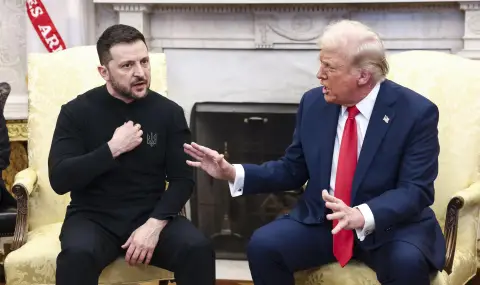Commentary by Edward Lucas for CEPA (Centre for European Policy Analysis). The author is a former journalist for The Economist, who has covered events in Central and Eastern Europe since 1986. An expert on cybersecurity and espionage, author of several books, including “The New Cold War“.
The streets of Brussels reflect the gratitude that Europeans feel for the titans of the past, people like Jean Monnet, Robert Schuman and Simone Weil. But in years to come, the grandest monument of all in the Belgian capital may be that of Donald Trump.
Fans will lay flowers in front of the colossal golden figure of the American president on February 28, commemorating his crucial contribution to their geopolitical emancipation, security and freedom.
That is the date Donald Trump welcomed [Ukrainian President] Volodymyr Zelensky to the White House. On that date, parents will solemnly tell their children that the Oval Office disaster has finally made Europeans take their security seriously.
European leaders have finally decided to take responsibility not only for Ukraine, but also for their own defense. In a series of hasty summits and phone calls, decades of complacency have given way to the grim, startled realization that when the US president proclaims “America First,” Europe must fend for itself. The one-time ally is at best unreliable, at worst actively hostile.
Is the erection of such a monument a fantasy? Probably. It would be more fitting to have a monument in the heart of Brussels honoring the millions of Ukrainians killed, maimed, traumatized, mourned, and driven out, whose sacrifice bought the rest of Europe time. Time to come to their senses. At the last minute, to avert catastrophe.
No one has ever apologized for Europe’s failures of defense and deterrence. Failures caused by the long sleep of European leaders.
The test of any change in Europe is deeds, not words. The priority is to give Ukraine the money and weapons it needs to defend itself (something that, if done in time, would have already ended the war). The stronger Ukraine’s military position, the harder it will be for the U.S. administration to force the Kiev leadership to cease fire on unfavourable terms.
The Europeans must also plan for Ukraine’s security after the ceasefire. They lack the troops, tanks, artillery, logistics, intelligence and other assets needed for a solid conventional defense. Instead, they will have to rely on deterrence: air power and long-range fire, backed by political unity. The question on every decision-maker’s desk should be: “What risks and costs will my country bear if Putin decides to attack again?” Without reliable answers, another attack by Putin would be disastrous for Ukraine and European security.
This is just the beginning. European NATO and EU countries must rethink their own security. Where is the air and missile defense? What about conscription? How do we get a reliable nuclear umbrella? How much longer can we rely on American weapons? All of these questions have answers; all come at a heavy price and with dangerous delays.
Vladimir Putin may not risk a direct military attack on a NATO member. But he is already waging a hybrid war against Europe: infrastructure sabotage, cyberattacks, a flood of dirty money and propaganda, attempts to restore the levers of economic influence. European leaders will need to increase their resilience and defense on all these fronts, from gas imports to the defense of democratic institutions.
This will cost a lot of money. Europeans will have to get used to higher taxes and lower living standards. Political leaders must explain [to their citizens] why these sacrifices are necessary. The Trump administration’s efforts to “make America great again” could seriously damage the alliances that once underpinned U.S. power. If the Europeans rise to the challenge, they could emerge as the surprise winners.
